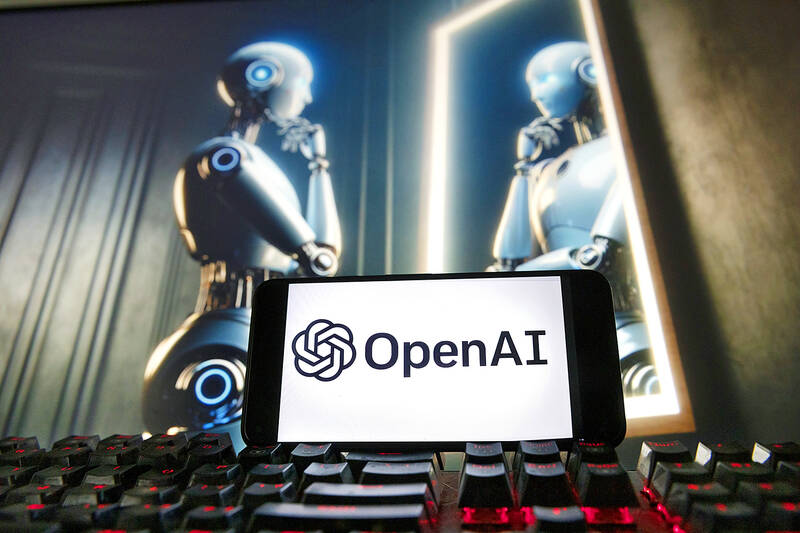OpenAI on Friday said that it has disbanded a team devoted to mitigating the long-term dangers of super-smart artificial intelligence (AI).
It began dissolving the so-called “superalignment” group weeks ago, integrating members into other projects and research, the San Francisco-based firm said.
OpenAI co-founder Ilya Sutskever and team coleader Jan Leike announced their departures from the company during the week.

Photo: Michael Dwyer, AP
The dismantling of a team focused on keeping sophisticated AI under control comes as such technology faces increased scrutiny from regulators and fears mount regarding its dangers.
“OpenAI must become a safety-first AGI [artificial general intelligence] company,” Leike wrote on X on Friday.
Leike called on all OpenAI employees to “act with the gravitas” warranted by what they are building.
OpenAI CEO Sam Altman responded to Leike’s post with one of his own.
Altman thanked Leike for his work at the company and said he was sad to see him leave.
“He’s right, we have a lot more to do,” Altman said. “We are committed to doing it.”
Altman promised more on the topic in the coming days.
Sutskever said on X that he was leaving after almost a decade at OpenAI, the trajectory of which “has been nothing short of miraculous.”
“I’m confident that OpenAI will build AGI that is both safe and beneficial,” he added, referring to computer technology that seeks to perform as well as — or better than — human cognition.
Sutskever, who is also OpenAI’s chief scientist, sat on the board that voted to remove Altman in November last year.
The ousting threw the company into a tumult, as staff and investors rebelled.
The OpenAI board ended up hiring Altman back a few days later.
OpenAI earlier last week released a higher-performing and even more human-like version of the AI technology that underpins ChatGPT, which was made free to all users.
“It feels like AI from the movies,” Altman said in a blog post.
Altman has previously pointed to Scarlett Johansson’s character in the movie Her, where she voices an AI-based virtual assistant dating a man, as an inspiration for where he would like AI interactions to go.
The day would come when “digital brains will become as good and even better than our own,” Sutskever said at a talk during a TED AI summit in San Francisco late last year.
“AGI will have a dramatic impact on every area of life,” Sutskever added.

POWERING UP: PSUs for AI servers made up about 50% of Delta’s total server PSU revenue during the first three quarters of last year, the company said Power supply and electronic components maker Delta Electronics Inc (台達電) reported record-high revenue of NT$161.61 billion (US$5.11 billion) for last quarter and said it remains positive about this quarter. Last quarter’s figure was up 7.6 percent from the previous quarter and 41.51 percent higher than a year earlier, and largely in line with Yuanta Securities Investment Consulting Co’s (元大投顧) forecast of NT$160 billion. Delta’s annual revenue last year rose 31.76 percent year-on-year to NT$554.89 billion, also a record high for the company. Its strong performance reflected continued demand for high-performance power solutions and advanced liquid-cooling products used in artificial intelligence (AI) data centers,

SIZE MATTERS: TSMC started phasing out 8-inch wafer production last year, while Samsung is more aggressively retiring 8-inch capacity, TrendForce said Chipmakers are expected to raise prices of 8-inch wafers by up to 20 percent this year on concern over supply constraints as major contract chipmakers Taiwan Semiconductor Manufacturing Co (TSMC, 台積電) and Samsung Electronics Co gradually retire less advanced wafer capacity, TrendForce Corp (集邦科技) said yesterday. It is the first significant across-the-board price hike since a global semiconductor correction in 2023, the Taipei-based market researcher said in a report. Global 8-inch wafer capacity slid 0.3 percent year-on-year last year, although 8-inch wafer prices still hovered at relatively stable levels throughout the year, TrendForce said. The downward trend is expected to continue this year,

A proposed billionaires’ tax in California has ignited a political uproar in Silicon Valley, with tech titans threatening to leave the state while California Governor Gavin Newsom of the Democratic Party maneuvers to defeat a levy that he fears would lead to an exodus of wealth. A technology mecca, California has more billionaires than any other US state — a few hundred, by some estimates. About half its personal income tax revenue, a financial backbone in the nearly US$350 billion budget, comes from the top 1 percent of earners. A large healthcare union is attempting to place a proposal before

Vincent Wei led fellow Singaporean farmers around an empty Malaysian plot, laying out plans for a greenhouse and rows of leafy vegetables. What he pitched was not just space for crops, but a lifeline for growers struggling to make ends meet in a city-state with high prices and little vacant land. The future agriculture hub is part of a joint special economic zone launched last year by the two neighbors, expected to cost US$123 million and produce 10,000 tonnes of fresh produce annually. It is attracting Singaporean farmers with promises of cheaper land, labor and energy just over the border.